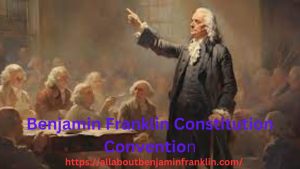Detailed information about Benjamin Franklin is given on this website. Today we will talk about the Benjamin Franklin Constitution Convention and you can also read the Benjamin Franklin Constitution
Benjamin Franklin Constitution Convention

Ben Franklin, at 81, was the senior statesman at a young convention, three times the age of the youngest delegate and twice the average age for all delegates, while Alexander Hamilton was 30, James Madison was 35, and George Washington was 55.
William Pierce, a Georgia delegate, documented Franklin’s widespread fame through character sketches in his journal, showcasing his prominence among the delegates in attendance.
Benjamin Franklin is a renowned physicist known for understanding nature’s operations and influencing the heavens and clouds. He is not a prominent politician, as he is not a Speaker or engages in politics. However, he is an extraordinary man who tells engaging stories.
His biography reveals that he is 82 years old and has an activity of mind equivalent to a 25-year-old youth. His claim to be the greatest physicist of the present age remains to be determined by posterity.
Benjamin Franklin, an unofficial host for delegates, opened his garden with dark beer or tea, and George Washington called him at his home in Philadelphia, just blocks from Independence Hall, as his first stop upon arrival.
Benjamin Franklin, who had been the only contender for the presiding officer position, intended to nominate Washington. However, due to stormy weather, he couldn’t attend the opening session, and the entire Pennsylvania delegation nominated him at his request.
James Madison documented the Convention’s proceedings, mentioning Washington’s unanimous election as president. He noted that the nomination was a favor from Penna, as Docr. Franklin could have been considered a competitor. The Docr. was supposed to nominate General Washington, but his health and weather prevented him from doing so.
Due to his poor health, he couldn’t walk to the Pennsylvania State House, so he used a sedan chair he brought home from Paris. He frequently wrote long speeches and requested a colleague to read them.
Despite doubts from William Pierce, Franklin had a long political career, starting as clerk of the Pennsylvania Assembly in 1736. He served as Pennsylvania’s agent in England and later as an emissary and ambassador for the colonies and newly liberated nation. His skills and moderate temperament, which sought to unite opposing parties, were instrumental in his success during the Convention.
Franklin, a visionary, embraced the possibilities set by the Constitution, sending a copy to Paris banker Ferdinand Grand in October before any state ratified it. This act exemplified his optimistic and universal outlook, as he sought political and financial support for the new nation.
The author sends a draft of a proposed new Federal Constitution for the states, which was formed during the last summer convention. Congress has sent it to the states for confirmation. If successful, the author believes Europe could execute Henry the 4th’s project of forming a Federal Union and one Grand Republic of all its states and kingdoms through a similar convention, as many interests needed to be reconciled.
In a future post, Franklin’s role at the Convention and concerns will be discussed, along with his final reflections after a long debate as delegates signed the Constitution, as recounted in Madison’s notes.
Doctor. Franklin observed a painting of a rising sun behind the President’s Chair during the last members’ signing. He noted that painters struggled to distinguish between a rising and a setting sun in their art. Franklin had often looked at the painting during the session, but now he has the happiness of knowing it is a rising sun, not a setting sun.